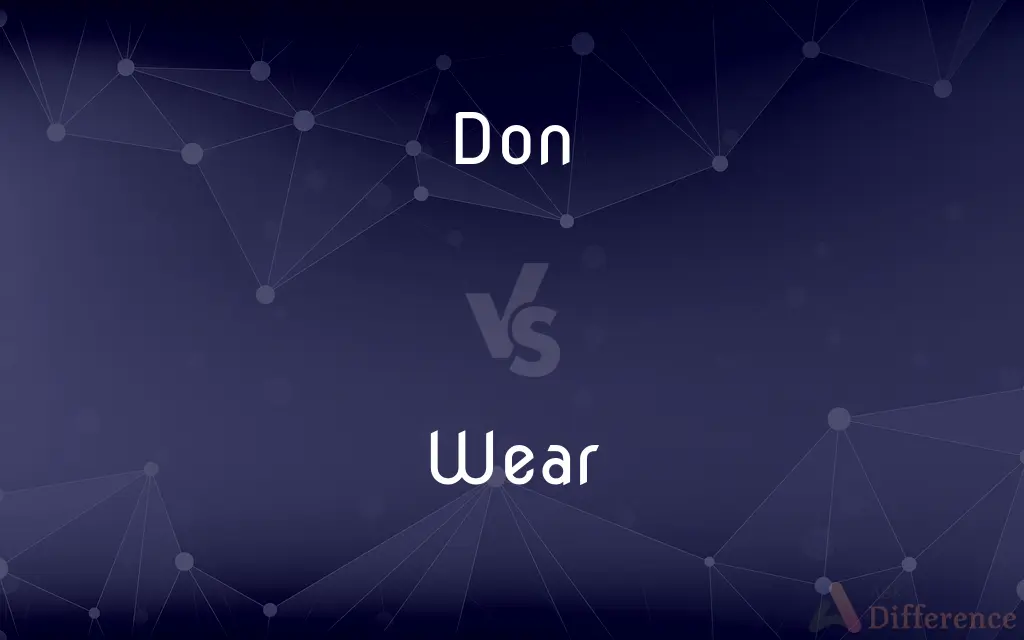Don vs. Wear — What's the Difference?
By Tayyaba Rehman & Urooj Arif — Updated on April 6, 2024
"Don" means to put on clothing, suggesting a deliberate act or preparation, while "wear" refers to having clothing on one's body or using something habitually over time.

Difference Between Don and Wear
Table of Contents
ADVERTISEMENT
Key Differences
Donning an item of clothing implies a specific, often intentional act of putting it on, usually in preparation for an event or activity. For example, one might don a suit for a job interview or a costume for a performance. On the other hand, wearing something generally refers to the act of having clothes on one's body at any given time and can also imply using an item regularly over a period, affecting its condition.
While donning is a momentary action focused on the initial act of putting clothing on, wearing encompasses both the act of having clothes on and the continuous effect this has on the clothes or item, including wear and tear. For instance, one might don a jacket when leaving the house but wear it through the seasons until it shows signs of age.
Donning often carries a connotation of formality or ceremony. It suggests a degree of care or deliberation in the choice of attire, as when donning a uniform or formal wear. Conversely, wearing does not inherently imply anything about the occasion or the care with which the item was chosen; it simply indicates that the item is being used or has been used over time.
The term "don" can also imply a certain respect or reverence for the clothing or gear being put on, acknowledging its significance or the role it represents. Wearing, in contrast, is a more neutral term, focusing on the function of clothing and its role in daily life without the connotative layers of preparation or respect.
The process of donning is always a conscious decision, involving a moment of transition from not wearing to wearing something. Wearing, however, can describe the state of having something on one's body both immediately after donning it and as a long-term condition, encompassing both the physical state and its temporal extension.
ADVERTISEMENT
Comparison Chart
Definition
To put on an item of clothing or accessory.
To have on one's body or to use an item over time.
Context
Often implies a specific occasion or deliberate action.
General use or the state of having clothes on.
Connotation
Can suggest formality or preparation.
Neutral; focuses on usage or condition over time.
Temporal Implication
Momentary action.
Indicates ongoing use or the state of being worn.
Relation to Condition
Primarily about the act of putting on.
Can imply the effects of usage, such as wear and tear.
Compare with Definitions
Don
To assume or take on a particular form or role.
She donned the role of mediator during the negotiations.
Wear
To exhibit or present a specific expression or appearance.
She often wears a smile.
Don
To put on a piece of equipment.
The diver donned his scuba gear before the dive.
Wear
To use or exhibit in one's appearance.
She likes to wear bright colors.
Don
To adorn oneself with an accessory.
She donned her grandmother's necklace for the wedding.
Wear
To have on the body as clothing, decoration, or protection.
He wears glasses for reading.
Don
To clothe oneself.
He quickly donned a shirt and jeans.
Wear
To deteriorate or become worse through use.
The sofa has started to wear at the edges.
Don
To put on an article of clothing.
He donned his coat before stepping out into the cold.
Wear
To bear or have on one's person.
He always wears his watch on his left wrist.
Don
Don (also dōn) Used as a courtesy title before the name of a man in a Spanish-speaking area.
Wear
Wear is the damaging, gradual removal or deformation of material at solid surfaces. Causes of wear can be mechanical (e.g., erosion) or chemical (e.g., corrosion).
Don
A head, tutor, or fellow at a college of Oxford or Cambridge.
Wear
To carry or have on one's person as covering, adornment, or protection
Wearing a jacket.
Must wear a seat belt.
Don
A college or university professor.
Wear
To carry or have habitually on one's person, especially as an aid
Wears glasses.
Don
The leader of an organized-crime family.
Wear
To display in one's appearance
Always wears a smile.
Don
(Archaic) An important personage.
Wear
To bear, carry, or maintain in a particular manner
Wears her hair long.
Don
To put on (clothing or an ornament, for example)
Donned long gloves for the costume party.
Don clown make-up for the performance.
Wear
To fly or display (colors). Used of a ship, jockey, or knight.
Don
To assume or take on
Donned the air of the injured party.
Wear
To damage, diminish, erode, or consume by long or hard use, attrition, or exposure. Often used with away, down, or off
Rocks worn away by the sea.
Shoes worn down at the heels.
Don
A university professor, particularly one at Oxford or Cambridge.
Wear
To produce by constant use, attrition, or exposure
Eventually wore hollows in the stone steps.
Don
An employee of a university residence who lives among the student residents.
Wear
To bring to a specified condition by long use or attrition
Wore the clothes to rags.
Pebbles worn smooth.
Don
A mafia boss.
Wear
To fatigue, weary, or exhaust
Your incessant criticism has worn my patience.
Don
(MLE) Any man, bloke, dude.
Wear
(Nautical) To make (a sailing ship) come about with the wind aft.
Don
(transitive) To put on clothing; to dress (oneself) in an article of personal attire.
To don one's clothes.
Wear
To last under continual or hard use
A fabric that will wear.
Don
Sir; Mr; Signior; - a title in Spain, formerly given to noblemen and gentlemen only, but now common to all classes.
Don is used in Italy, though not so much as in Spain. France talks of Dom Calmet, England of Dan Lydgate.
Wear
To last through the passage of time
A friendship that wears well.
Don
A grand personage, or one making pretension to consequence; especially, the head of a college, or one of the fellows at the English universities.
Wear
To break down or diminish through use or attrition
The rear tires began to wear.
Don
To put on; to dress in; to invest one's self with.
Should I don this robe and trouble you.
At night, or in the rain,He dons a surcoat which he doffs at morn.
Wear
To pass gradually or tediously
The hours wore on.
Don
A Spanish title of respect for a gentleman or nobleman
Wear
(Nautical) To come about with stern to windward.
Don
Teacher at a university of college (especially at Cambridge or Oxford)
Wear
The act of wearing or the state of being worn; use
This shirt is ideal for wear in sultry climates.
Don
The head of an organized crime family
Wear
Clothing, especially of a particular kind or for a particular use. Often used in combination
Rainwear.
Footwear.
Don
Celtic goddess; mother of Gwydion and Arianrhod; corresponds to Irish Danu
Wear
Damage resulting from use or age
The rug shows plenty of wear.
Don
A European river in southwestern Russia; flows into the Sea of Azov
Wear
The ability to withstand impairment from use or attrition
The engine has plenty of wear left.
Don
Put clothing on one's body;
What should I wear today?
He put on his best suit for the wedding
The princess donned a long blue dress
The queen assumed the stately robes
He got into his jeans
Wear
To carry or have equipped on or about one's body, as an item of clothing, equipment, decoration, etc.
He's wearing some nice pants today.
She wore her medals with pride.
Please wear your seatbelt.
Can you wear makeup and sunscreen at {{the same time?
}} He was wearing his lunch after tripping and falling into the buffet.
Wear
To have or carry on one's person habitually, consistently; or, to maintain in a particular fashion or manner.
He wears eyeglasses.
She wears her hair in braids.
Wear
To bear or display in one's aspect or appearance.
She wore a smile all day.
He walked out of the courtroom wearing an air of satisfaction.
Wear
To overcome one's reluctance and endure a (previously specified) situation.
I know you don't like working with him, but you'll just have to wear it.
Wear
To eat away at, erode, diminish, or consume gradually; to cause a gradual deterioration in; to produce (some change) through attrition, exposure, or constant use.
You're going to wear a hole in the bottom of those shoes.
The water has slowly worn a channel into these rocks.
Long illness had worn the bloom from her cheeks.
Exile had worn the man to a shadow.
Wear
To undergo gradual deterioration; become impaired; be reduced or consumed gradually due to any continued process, activity, or use.
The tiles were wearing thin due to years of children's feet.
Wear
To exhaust, fatigue, expend, or weary.
His neverending criticism has finally worn my patience.
Toil and care soon wear the spirit.
Our physical advantage allowed us to wear the other team out and win.
Wear
(intransitive) To last or remain durable under hard use or over time; to retain usefulness, value, or desirable qualities under any continued strain or long period of time; sometimes said of a person, regarding the quality of being easy or difficult to tolerate.
Don't worry, this fabric will wear. These pants will last you for years.
This color wears so well. I must have washed this sweater a thousand times.
I have to say, our friendship has worn pretty well.
It's hard to get to know him, but he wears well.
Wear
(in the phrase "wearing on (someone)") To cause annoyance, irritation, fatigue, or weariness near the point of an exhaustion of patience.
Her high pitched voice is really wearing on me lately.
Wear
To pass slowly, gradually or tediously.
Wear on, wear away.
As the years wore on, we seemed to have less and less in common.
Wear
(nautical) To bring (a sailing vessel) onto the other tack by bringing the wind around the stern (as opposed to tacking when the wind is brought around the bow); to come round on another tack by turning away from the wind. Also written "ware". Past: weared, or wore/worn.
Wear
To guard; watch; keep watch, especially from entry or invasion.
Wear
To defend; protect.
Wear
To ward off; prevent from approaching or entering; drive off; repel.
To wear the wolf from the sheep
Wear
To conduct or guide with care or caution, as into a fold or place of safety.
Wear
(uncountable) (in combination) clothing
Footwear; outdoor wear; maternity wear
Wear
(uncountable) damage to the appearance and/or strength of an item caused by use over time
Wear
(uncountable) fashion
Wear
Same as Weir.
Wear
The act of wearing, or the state of being worn; consumption by use; diminution by friction; as, the wear of a garment.
Wear
The thing worn; style of dress; the fashion.
Motley 's the only wear.
Wear
The result of wearing or use; consumption, diminution, or impairment due to use, friction, or the like; as, the wear of this coat has been good.
Wear
To cause to go about, as a vessel, by putting the helm up, instead of alee as in tacking, so that the vessel's bow is turned away from, and her stern is presented to, the wind, and, as she turns still farther, her sails fill on the other side; to veer.
Wear
To have or exhibit an appearance of, as an aspect or manner; to bear; as, she wears a smile on her countenance.
His innocent gestures wearA meaning half divine.
Wear
To use up by carrying or having upon one's self; hence, to consume by use; to waste; to use up; as, to wear clothes rapidly.
Wear
To impair, waste, or diminish, by continual attrition, scraping, percussion, on the like; to consume gradually; to cause to lower or disappear; to spend.
That wicked wight his days doth wear.
The waters wear the stones.
Wear
To cause or make by friction or wasting; as, to wear a channel; to wear a hole.
Wear
To form or shape by, or as by, attrition.
Trials wear us into a liking of what, possibly, in the first essay, displeased us.
Wear
To endure or suffer use; to last under employment; to bear the consequences of use, as waste, consumption, or attrition; as, a coat wears well or ill; - hence, sometimes applied to character, qualifications, etc.; as, a man wears well as an acquaintance.
Wear
To be wasted, consumed, or diminished, by being used; to suffer injury, loss, or extinction by use or time; to decay, or be spent, gradually.
Away, I say; time wears.
Thou wilt surely wear away, both thou and this people that is with thee.
His stock of money began to wear very low.
The family . . . wore out in the earlier part of the century.
Wear
Impairment resulting from long use;
The tires showed uneven wear
Wear
A covering designed to be worn on a person's body
Wear
The act of having on your person as a covering or adornment;
She bought it for everyday wear
Wear
Be dressed in;
She was wearing yellow that day
Wear
Have on one's person;
He wore a red ribbon
Bear a scar
Wear
Have in one's aspect; wear an expression of one's attitude or personality;
He always wears a smile
Wear
Deteriorate through use or stress;
The constant friction wore out the cloth
Wear
Have or show an appearance of;
Wear one's hair in a certain way
Wear
Last and be usable;
This dress wore well for almost ten years
Wear
Go to pieces;
The lawn mower finally broke
The gears wore out
The old chair finally fell apart completely
Wear
Exhaust or tire through overuse or great strain or stress;
We wore ourselves out on this hike
Wear
Put clothing on one's body;
What should I wear today?
He put on his best suit for the wedding
The princess donned a long blue dress
The queen assumed the stately robes
He got into his jeans
Common Curiosities
Can "don" be used in formal settings?
Yes, "don" often carries a formal or ceremonial connotation, making it suitable for formal settings.
How does context affect the use of don vs. wear?
The choice between don and wear can be influenced by the context, with don suggesting a specific, often formal action, and wear indicating general use or state.
Is wearing limited to clothing?
No, wearing can also refer to the habitual use of accessories, the display of expressions, or the condition of objects over time.
How does "wear and tear" relate to wearing?
"Wear and tear" refers to the deterioration of an item due to regular use, which is a direct consequence of wearing something over time.
What role does functionality play in donning vs. wearing?
Functionality may be a key reason for donning something (e.g., protective gear), while wearing focuses more on the use and effect of the item over time.
What is the difference between donning and wearing a hat?
Donning a hat refers to the act of putting it on, while wearing a hat indicates that the hat is on one's head, potentially over a period.
Does wearing always indicate physical wear?
While wearing can lead to physical wear, it also simply refers to the act of having something on one's body.
What does it mean to don something?
To don something means to put on an item of clothing or accessory, often with a degree of formality or preparation.
Can an item be donned more than once?
Yes, an item can be donned multiple times; each act of putting it on is considered donning.
How do don and wear relate to personal identity?
Both can relate to personal identity: donning might express a deliberate choice or role, while wearing can reflect long-term personal style or preferences.
Is there a psychological aspect to donning attire?
Yes, donning attire can be a deliberate act associated with assuming a role or mindset, implying a psychological transition.
Can "wear" imply a long-term relationship with an item?
Yes, wear can imply a long-term relationship with an item, including familiarity, affection, or dependency on it for function or comfort.
Is donning a quicker action than wearing?
Donning is a specific momentary action, whereas wearing can describe both an immediate state and a long-term process.
Can "wear" be used metaphorically?
Yes, wear can be used metaphorically to describe bearing an expression or maintaining an appearance.
How do cultural differences impact the concepts of donning and wearing?
Cultural norms and practices can influence the significance, occasions, and perceptions related to donning and wearing, reflecting diverse values and traditions.
Share Your Discovery

Previous Comparison
Misgrade vs. Misgraded
Next Comparison
Corrosion vs. OxidationAuthor Spotlight
Written by
Tayyaba RehmanTayyaba Rehman is a distinguished writer, currently serving as a primary contributor to askdifference.com. As a researcher in semantics and etymology, Tayyaba's passion for the complexity of languages and their distinctions has found a perfect home on the platform. Tayyaba delves into the intricacies of language, distinguishing between commonly confused words and phrases, thereby providing clarity for readers worldwide.
Co-written by
Urooj ArifUrooj is a skilled content writer at Ask Difference, known for her exceptional ability to simplify complex topics into engaging and informative content. With a passion for research and a flair for clear, concise writing, she consistently delivers articles that resonate with our diverse audience.















































